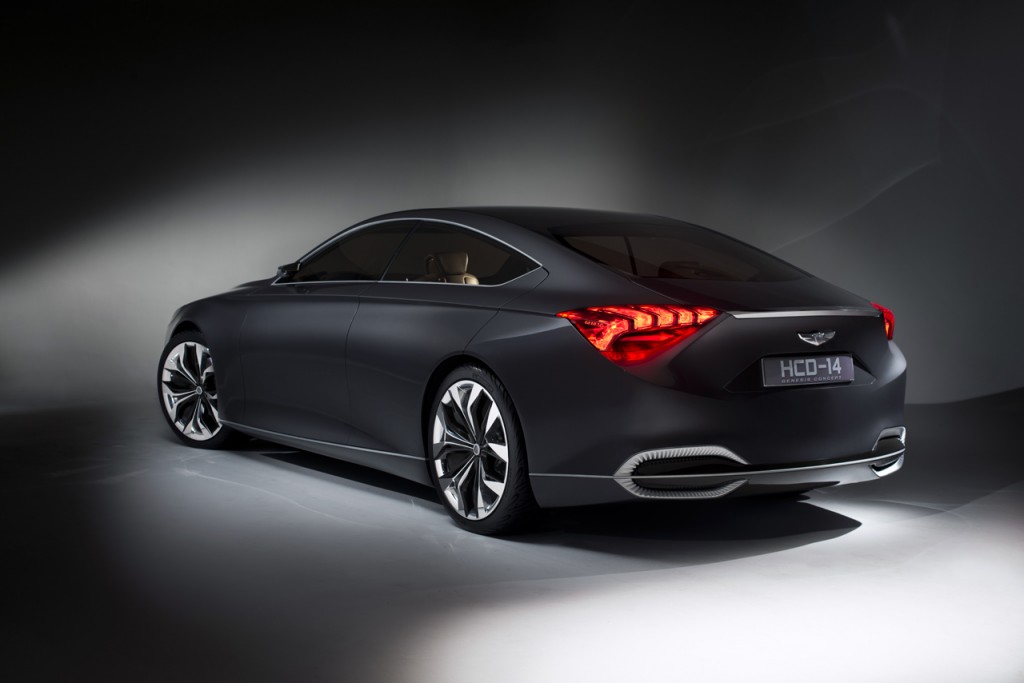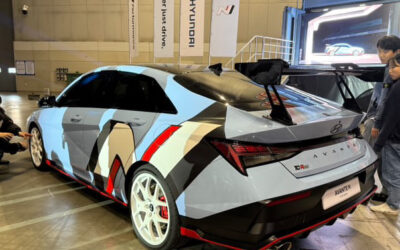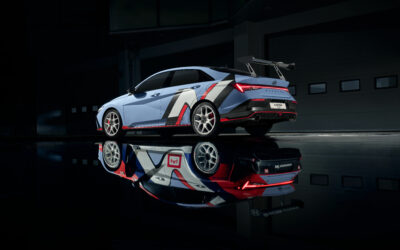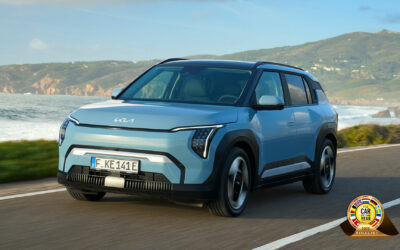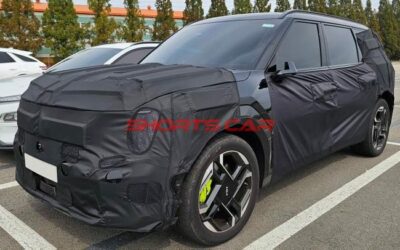Having finished 2012 with five-straight years of premium segment sales growth with its Genesis and Equus vehicle lines, today Hyundai unveiled its design direction for future premium vehicles with its HCD-14 Genesis concept at the North American International Auto Show.
“We’ve departed from industry convention in many of our premium product, marketing, sales and service approaches, and it’s worked out pretty well, with Genesis and Equus now delivering a nine percent retail market share in their premium segments, higher than the five percent retail share Hyundai brand achieves in the overall industry,” said John Krafcik, president and CEO, Hyundai Motor America. “This success paves the way for a new generation of rear-wheel drive premium products. HCD-14 Genesis gives a hint of the design direction we’ll be taking, and an indication of the focus we’re placing on driving dynamics and technology.”
PREMIUM SEGMENT SHARE GROWTH
| Total Sales/Year | 2008 | 2009 | 2010 | 2011 | 2012 |
| Genesis | 6,167 | 21,889 | 29,122 | 32,998 | 33,973 |
| Equus | – | – | 196 | 3,193 | 3,972 |
| Total Hyundai Premium Models | 6,167 | 21,889 | 29,318 | 36,191 | 37,945 |
| Total Hyundai Premium Retail Share * | 1.4% | 6.3% | 7.2% | 8.8% | 9.0% |
* Entry-Premium Coupe, Mid-Luxury, Premium Luxury segments
Genesis and Equus’ premium segment success extends beyond sales and market share. In residual value retention, ALG rates Genesis’ 36-month residual value higher than both its Asian and domestic competition, while Equus residual values exceed its well-established European competitors after three years of ownership.
| ALG Residual Values (%) | Genesis Sedan |
BMW 5-Series |
Mercedes E-Class |
Lexus GS |
Cadillac CTS |
| Jan-Feb 2013 | 50.5 | 43.5 | 48.0 | 49.9 | 44.0 |
| ALG Residual Values (%) | Equus | Lexus LS |
BMW 7-Series |
Audi A8 |
Mercedes S-Class |
| Jan-Feb 2013 | 45.0 | 49.5 | 42.5 | 43.0 | 43.0 |
Further, Genesis and Equus are attracting higher buyer demographics to the Hyundai brand than ever before. Since the launch of Genesis in 2008, the share of Hyundai buyers with household incomes above $100,000 has increased by 25%, indicating just how far products like Genesis have improved demographics for the brand. Finally, despite capacity constraints, Genesis Coupe annual sales have exceeded those of its Infiniti G37 premium coupe competitor since its introduction to the premium sport coupe segment in 2009, and it remains one of the fastest turning vehicles in Hyundai’s lineup.
FLUIDIC PRECISION DESIGN
HCD-14 Genesis conveys a fluidic-precision, liquid-metal design language. Craftsmanship quality is conveyed via gemstone-like design surfaces. A bold front fascia surrounds brushed metal grille surfaces with a deep vertical grille opening. The corners of the rear hood incorporate heat extractor design accents that integrate seamlessly with exterior mirror design. From the side view silhouette, classic rear-drive sport sedan proportions are conveyed by an extended dash-to-axle length, short overhangs, large-diameter wheels, sharply-tapered greenhouse, and short rear deck. Large wheels were developed from a mix of premium lightweight alloys with carbon fiber surrounding the voided areas of the wheel design.
“We instilled HCD-14 Genesis with a premium-sport 4-door coupe road presence,” said Christopher Chapman, chief designer, Hyundai Design North America. “Its sleek and lightweight silhouette does not punish the wind, but uses fluidic precision with dramatic surfacing that conveys natural restraint. Inside, a driver-centric cockpit prioritizes dramatic sculpture over infotainment button overload. Laminated and milled-wood detailing delivers a fresh, topographical map-like visual interest throughout the cabin-length center console.”
REAR-HINGED REAR DOOR CABIN ACCESS
Opening the rear door reveals a rear-hinged configuration, with a single, oversized, brushed-aluminum hinge articulating diagonally from the rear door cutline. With both doors open, HCD-14 Genesis has an inviting and commodious cabin ambience. Inside the cabin, a double-cresting-wave center console design carries from the instrument panel through to the rear seats. This design-wave theme further influences the interior door handles and rear headrest hoods. Gauges and driver data are provided via an eclectic fusion of both analog and digital sources, with aviation-derived design cues. The driver-focused cockpit offers an asymmetrical center stack, with critical driving functions separated from passenger comfort functions. The center console even includes an iPad® tablet storage station, keeping it secure in spirited driving.

ACTIVE DRIVER SAFETY TECHNOLOG
While the HCD-14 Genesis exterior design makes a statement all its own, the driver’s environment is where its technological innovation breaks new ground. Ergonomics engineers eliminated the traditional center stack, developing an intuitive driver interface system that allows the HCD-14 driver to better keep his eyes on the road. Freed from traditional design restrictions, designers created a controls layout devoid of intimidating clusters of buttons and knobs. Using state-of-the-art driver eye-tracking and 3-D hand-gesture recognition, HCD-14 Genesis is able to recognize driver commands free from the distractions associated with manual controls. Once a specific feature is selected via eye-tracking, thumb controls or gesture recognition can be used to select navigation, infotainment, audio, HVAC, and even smartphone connectivity functions. This intuitive interface provides the driver with complete control while keeping his eyes safely above the cowl plane, using a windshield heads-up display (HUD) for minimal driving distraction. This proprietary interface represents Hyundai’s vision for future vehicle HMI and sets a new benchmark in active driver safety technology.
DRIVER-CENTRIC VEHICLE DYNAMICS
HCD-14’s innovative eye-tracking and gesture-based controls reduce typical driving distractions, resulting in a more focused driver able to better appreciate the day-to-day satisfaction of exceptional vehicle dynamics. To this end, HCD-14 Genesis vehicle dynamics take the driver to a new level of involvement, focus, and control. An ultra-rigid chassis with strategic use of high-tensile steel provides a vault-like platform for the rear-drive powertrain configuration. Sophisticated five-link front and rear suspension reduces suspension-travel changes to camber and toe for consistent grip out of bends. A multi-mode power steering system retains road feel and feedback advantages while yielding the efficiency benefits of an electronic system. Low-profile performance tires yield outstanding turn-in response, mid-corner grip, and road feel. A sophisticated yaw-control system provides multiple driver-selected options for changing road conditions and driving preferences. Such an advanced complement of tarmac-gripping technologies requires an equally-impressive powertrain to be fully exploited, and the Hyundai-developed Tau® V8 engine is more than up to the task.
DIRECT-INJECTED TAUV8 POWER
The HCD-14 Genesis powertrain features the award-winning Hyundai Tau V8 engine, displacing 5.0-liters, with direct injection and Dual Continuously Variable Valve Timing (D-CVVT), for impressive power, low emissions and superb efficiency. HCD-14 Genesis uses optical recognition to identify the driver and initiate the starting sequence, while gear selection for the 8-speed automatic transmission is performed via paddle shifters. HCD-14 Genesis exhaust is ceramic-lined and was tuned for minimal backpressure, maximum high-rpm horsepower, and a deep baritone note, with cooling fins integrated into ultra-wide exhaust tips.


